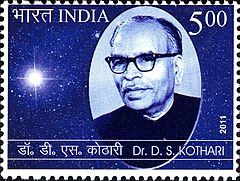Daulat Singh Kothari
Daulat Singh Kothari | |
|---|---|
 Kothari on a 2011 stamp of India | |
| Born | 6 July 1906 |
| Died | 4 February 1993 (aged 86) Delhi, India |
| Known for |
|
| Awards | Padma Bhushan (1962) Padma Vibhushan (1973) |
| Scientific career | |
| Doctoral advisor | Ralph H. Fowler[1] |
Daulat Singh Kothari (6 July 1906 – 4 February 1993) was an Indian scientist and educationist.[2]
Early life and education[edit]
D. S. Kothari was born in the princely state of Udaipur in Rajputana on 6 July 1906.[2] son of a Jain Headmaster.[3] His father died in the plague epidemic of 1918 and was raised by his mother. He had his early education at Udaipur and Indore and received a master's degree in physics from Allahabad University in 1928 under guidance of Meghnad Saha.[4] D. S. Kothari "went to Cavendish Laboratory on a U.P. Government fellowship in 1930 and worked with Ernest Rutherford, P. Kapitza, and R. H. Fowler".[5] He was awarded a PhD from Cambridge University in May 1933 with a thesis entitled "The quantum statistics of dense matter"[6] and he published in the Proceeding of the Royal Society, London.[7]
Role as an educationist[edit]
After his return to India, he worked at the Delhi University from 1934 to 1961 in various capacities as reader, professor and Head of the Department of Physics. He was scientific advisor to Ministry of Defence from 1948 to 1961 and was then appointed as chairman of the University Grants Commission in 1961 where he worked till 1973.[2] He was the chairman of the Indian Education Commission of 1964–66, popularly known as Kothari Commission, which was the first ad hoc commission set up in India for the modernization and standardization of education in India.[8][9]
Dr. D S Kothari[2] (Padma Bushan & Padma Vibhushan), Scientific Advisor to Ministry of Defence, Govt. of India is an Outstanding Physicist, Educationalist and considered as the Architect of Defence Science in India. Founder of most of the DRDO labs in India i.e. Naval Dockyard Laboratory (later renamed Naval Chemical and Metallurgical Laboratory), Mumbai, Indian Naval Physical Laboratory, Kochi, Centre for Fire Research, Delhi, Solid State Physics Laboratory, Delhi, Defence Food Research Laboratory, Mysore, Defence Institute of Physiology and Allied Sciences, Chennai, Directorate of Psychological Research, New Delhi, Defence Electronics and Research Laboratory, Hyderabad, Scientific Evaluation Group, Delhi, Technical Ballistic Research Laboratory, Chandigarh. D S Kothari Played a crucial role in setting up of UGC and NCERT. Dr. D S Kothari and Dr. P Blackett worked together in Cavendish Laboratory, Cambridge University under the guidance of Lord Ernst Rutherford, the Father of Nuclear physics, later together they paved the defence[10] education[11][12] system in India.
Achievements and honours[edit]
D. S. Kothari was president of the Indian Science Congress at its golden jubilee session in 1963. He was elected President of Indian National Science Academy in 1973. His research on statistical thermodynamics and his Theory of White Dwarf Stars gave him an international reputation.[2]
The Padma Bhushan was conferred on him in 1962, and the Padma Vibhushan in 1973.[13] He was also listed as a "Proud Past Alumni" by the "Allahabad University Alumni Association.[14] In 2011, the Department of Posts issued a commemorative stamp in his honour. He was conferred Atmaram Award in 1990 by the Central Hindi Directorate, Ministry of Human Resource Development.[15] One of the postgraduate men's hostels at Delhi University ( North Campus ) bears his name.
References[edit]
- ^ Panchapakesan, N. (July 1994). "DS Kothari and Delhi University" (PDF). Defence Science Journal. 44 (3): 199–202.
- ^ a b c d e Kothari, D S. "Kothari Daulat Singh: The Architect of Defence Science in India".
- ^ "Daulat Singh Kothari, Biographical Memoirs, Indian National Science Academy (INSA)" (PDF). Archived from the original (PDF) on 18 April 2022. Retrieved 14 April 2021.
- ^ "Meghnad Saha, 1893-1956". Biographical Memoirs of Fellows of the Royal Society. 1 February 1960. doi:10.1098/rsbm.1960.0017.
- ^ Roy, Amit (2020). "Daulat Singh Kothari (1906–1993): Scientist, Teacher, Administrator and Humanist". Resonance. 25 (9): 1179–1184. doi:10.1007/s12045-020-1037-4. ISSN 0971-8044.
- ^ Cambridge University Library catelogue card with the text "Kothari (Daulat Singh) Ph.D. 562 The applications of quantum statistics to dense matter. 4°, 22 May 1933."
- ^ "Neutrons, degeneracy and white dwarfs". Proceedings of the Royal Society of London. Series A - Mathematical and Physical Sciences. 162 (911): 521–528. 15 October 1937. doi:10.1098/rspa.1937.0200. ISSN 0080-4630.
- ^ J C Aggarwal (2009). Landmarks In The History Of Modern Indian Education, 6E. Vikas Publishing House. p. 626. ISBN 9788125924029.
- ^ "Indian Education Commission 1964-66". PB Works. 2015. Retrieved 20 June 2015.
- ^ DIAT. "Defence institute of advanced technology".
- ^ Kothari, D S (19 December 2019). "Dr. D. S. Kothari Postdoc Fellowship Biological Science Scheme".
- ^ Kothari, D. S. "Guidelines of D. S. Kothari Post Doctoral Fellowships in Sciences" (PDF).
- ^ "Padma Awards" (PDF). Ministry of Home Affairs, Government of India. 2015. Archived from the original (PDF) on 15 October 2015. Retrieved 21 July 2015.
- ^ "Allahbad University Alumni Association : Our Proud Past". 7 July 2012. Archived from the original on 7 July 2012.
- ^ "List of Awardees". Khsindia. Archived from the original on 30 July 2016. Retrieved 26 January 2019.
- 1906 births
- 1993 deaths
- 20th-century Indian physicists
- Recipients of the Padma Vibhushan in science & engineering
- Recipients of the Padma Bhushan in civil service
- University of Allahabad alumni
- People from Udaipur
- Scientists from Rajasthan
- Fellows of the Indian National Science Academy
- Foreign Members of the USSR Academy of Sciences
- Foreign Members of the Russian Academy of Sciences
